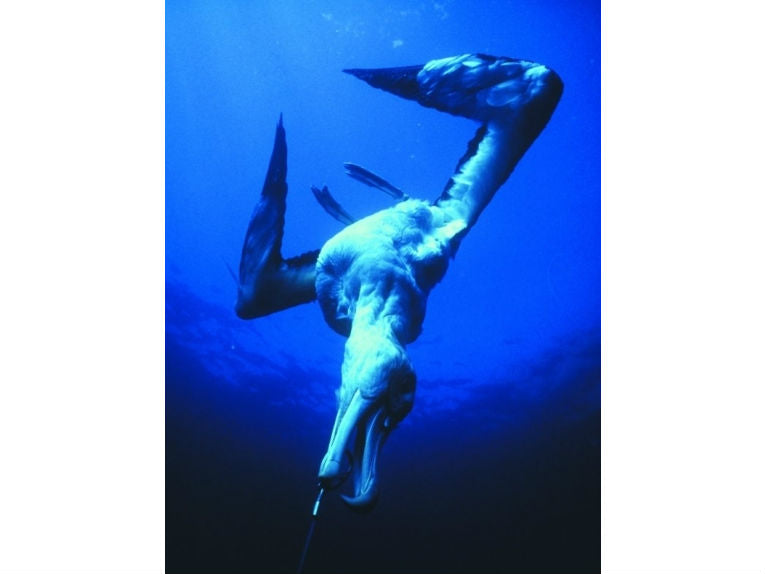It's one of the saddest of bycatches inflicted by careless fishing fleets - droves of majestic albatrosses snagged on the hooks and lines of longline fishing boats, and dragged to their watery deaths. And since the practice became widely implicated in the decline of these most beautiful of oceanic birds, newer bird-friendly forms of longlined fishing have helped to slash the toll.
But a new study by scientists from BirdLife International, working with the UK's RSPB, has shown that a startling 300,000 birds per year are still dying needlessly from this practice - a number three times previous estimates. That rise is because of the discovery of bird deaths from fleets that have previously not been accounted for - as they didn't keep bycatch information. This new study, published in the journal Endangered Species Research, is now starting to fill in some of those blanks.
The problem lines are deployed by fishing fleets all over the world. They consist of long lines trailed from boats, which can be 100km in length. Baited hooks are set at intervals, in order to snare large predatory fish, such as swordfish, tuna and halibut. But birds are also tempted by the bait, often with fatal consequences - especially for juvenile birds.
Those early deaths are contributing to the long-term decline of many sea-bird species. Of 22 albatross species worldwide, 17 are classified as threatened. Dr Orea Anderson, lead author of the study, said 'It is little wonder that so many of the affected seabird species are threatened with extinction - their slow rate of reproduction is simply incapable of compensating for losses on the scale this study has demonstrated.'
However things really shouldn't be so bleak, some three decades after the problem was first publicized. The technology for avoiding such deaths has been around for many years, and has been proven to work. It is a simple matter of weighting hooks, so that they sink deeper, or adding bird-scaring measures. When regulations enforcing such technology were enforced near South Georgia, in the Southern Ocean, seabird deaths plummeted by 99%.
More and more nations are acting to put such protection in place, but there are many fleets which continue top avoid regulation, or to submit information on bycatch. To sort out the problem requires global action, with every nation ensuring that fishing fleets, registered under their flag, comply with these relatively inexpensive conservation practices.
But BirdLife International and the RSPB aren't sitting on their hands waiting for that to happen. As well as pressing regional fisheries through their Global Seabird Program, they are also getting involved directly with fishermen - in 7 bycatch hotspots - as part of the Albatross Task Force. Education, it is hoped, will change attitudes, and so help to restore the albatross as the crowning glory of the oceans' skies.
Top Image Credit: Graham Robertson/Australian Antarctic Division.










